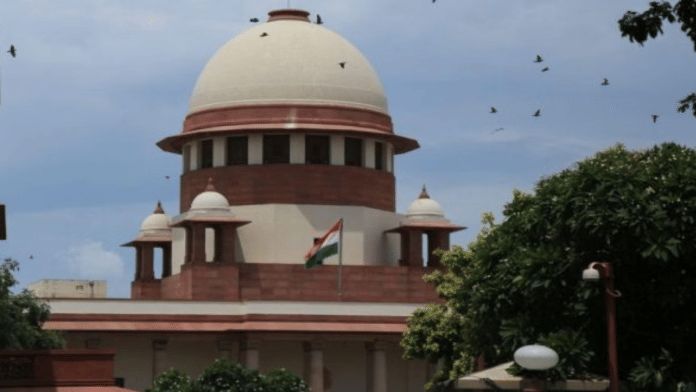New Delhi: A two-judge Supreme Court bench expressed “pain” at the growing trend of the top court re-visiting and overturning its own judgements, saying the reversals undermine its authority and reflect inconsistency in the institution’s functioning.
A bench of Justices Dipankar Dutta and Augustine George Masih observed Wednesday that judgements reversing earlier verdicts are usually delivered at the behest of a party aggrieved by the prior decision.
This, it said, defeats the objective of Article 141 of the Constitution, which says that a Supreme Court verdict is the “law of the land”, meaning that the pronouncement of a verdict by a bench is final.
But the prospects of reopening the dispute before a succeeding bench, hoping that a change in composition will yield a different outcome, would undermine the top court’s authority and the value of its pronouncements.
The observation came weeks after the Supreme Court modified its orders in the stray dogs matter and the Vanashakti case, allowing post-facto environment clearances.
“A matter that is res integra (already decided) may not be reopened or revisited or else consistency in legal interpretation could be compromised and the special authority that is invested in decisions of this court, under Article 141, lost,” the bench said.
“The weight and influence of that special authority depend on the credibility we, the judges, give to it. As judges of this court, we are alive to the position that overturning a prior verdict by a later verdict does not necessarily mean that justice is better served.”
It quoted American lawyer, jurist Justice Robert Jackson’s famous statement, “We are not final because we are infallible, but we are infallible only because we are final.”
“It requires restatement that it is fundamental to the rule of law to maintain the sanctity and finality of judicial verdicts,” the bench observed.
Upholding the finality of verdicts is necessary not just to prevent endless litigation, but also to maintain public confidence in the judiciary.
“Judicial orders which determine issues arising between the parties to the lis bind them and its conclusive nature ensures resolution of disputes so that justice is served. The strength of judicial power lies less in the hope of perfection and more in the confidence that decisions, once made, are settled,” the bench said.
Also Read: Drawing clear line on autonomy of tribunals, SC scraps 2021 Act, calls it ‘legislative override’
Kolkata murder case
The warning came while hearing an application filed by Anisur Rahaman, who is facing a murder trial in Kolkata and had sought modification of a bail condition imposed by the SC.
Anisur was granted bail in January by a bench then led by Justice Abhay S. Oka (since retired) and comprising Justice Masih. The bench observed that he had already spent more than five years in jail, and that the trial court had failed to complete the trial in six months, as suggested by the Supreme Court in March 2023.
One of the bail conditions confined Anisur to Kolkata, barring him from leaving the city. He was also ordered to mark his attendance every day at a designated police station, as directed by the trial court.
The bench also ordered that if the trial was delayed because of Anisur’s non-cooperation or if his advocate indulged in unnecessary long cross-examination, his bail would be cancelled.
In May, a coordinate bench comprising Justice Oka and Justice Ujjal Bhuyan dismissed Anisur’s request to modify his bail condition that restricted his movement, saying that no case “is made out at this stage”.
The bench of Justices Dutta and Masih was also hearing a counter-application filed by the victim’s brother seeking cancellation of Anisur’s bail plea. The application drew the court’s attention to the main complainant and crucial witnesses turning hostile during the trial.
As the bench showed deference to the previous orders, it observed: “Judicial discipline, propriety and comity, which are also inseparable parts of a just and proper decision-making process, demand that a subsequent bench of different combination defers to the view expressed by the earlier bench, unless there is something so grossly erroneous on the face of the record or palpably wrong that it necessitates a re-look in exercise of inherent jurisdiction either by a review petition or through a curative petition.”
The court noted that the issue before it was related to a citizen’s right to move freely, a case where the principle of finality may not apply strictly.
But it declined to modify Anisur’s bail conditions, saying there was no change of circumstances on the ground that warranted a reconsideration of the stipulations.
“The very purpose of the order granting bail, in this case, would stand frustrated if the conditions requiring Anisur not to leave Kolkata were modified,” it said.
The stringent bail conditions were to balance the competing interests of the need for incarceration and the right to liberty, the bench observed.
“If any modification of such a condition is made now and thereby the stringency relaxed, that would not only amount to overstepping the order of this court granting bail but would send a wrong message of this court being unconcerned with the principle of finality of judicial decisions,” it said.
The bench also rejected the application that sought cancellation of Anisur’s bail, observing the victim’s brother had failed to establish the accused’s influence over the complainant and witnesses who had resiled during their examination.
(Edited by Sugita Katyal)






